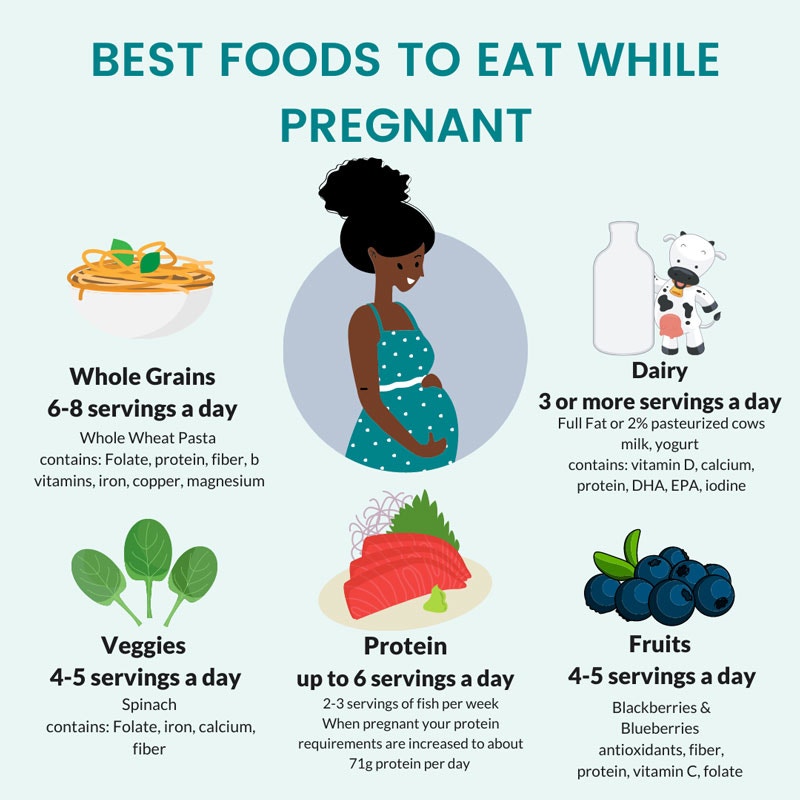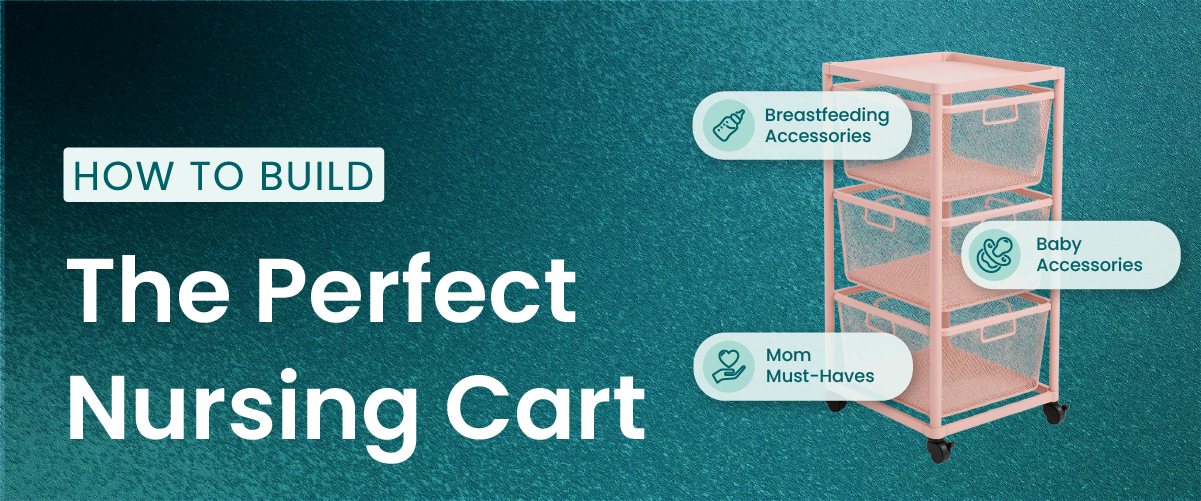Having a well-balanced nutritional plan is one of the foundational pieces to having a healthy pregnancy. What you put in your body not only affects your health, but your baby's future health and can have an impact on your labor and delivery, too. Which is why it is so important to make sure you know which foods are the best ones to eat during pregnancy and what makes one food a better choice over another food.
Nutrition Basics
So let's start with the basics: food is made up of macronutrients and micronutrients. Your body needs macronutrients for energy and there are three groups of them: proteins, fats, and carbohydrates. Micronutrients are vitamins and minerals that are required by your body for all of its functions. In order to have a healthy diet, it is important for pregnant women to get a good balance of macronutrients and adequate amounts of micronutrients. Baby's growth and development depend on you eating the best foods all the way through your third trimester! While your macronutrient intake might change with each trimester, your micronutrient requirements will mostly stay the same. If you are breastfeeding after the baby is born, you are still feeding 2 people and might find that not much changes, even though you're feeding baby on the outside now.
Macronutrients
Let's start by talking about macronutrients! When you think about macros, balance is the key. Each group contributes something important to your body during pregnancy. In the first trimester, many pregnant people struggle with morning sickness and carbohydrates like bread and pasta made with whole grains may be the only thing that will sit well in your stomach.
I like to tell people--what happens in the first trimester stays in the first trimester! Even with those carb cravings, make the most of the foods you're eating. Some carbohydrates will raise your blood sugar more than others, which can make your morning sickness even worse.
Some good carbohydrates that are nutrient rich foods and are lower on the glycemic index are: greek yogurt, sweet potatoes, fresh fruits & berries, brown rice, lentils, and bread made with whole grains.


Rachel Abers, MS, RDN, LDN
As you move into the second trimester you will hopefully begin to feel less nauseous and be able to incorporate more proteins and veggies into the meals you make. Try to avoid processed foods throughout your pregnancy and aim to eat at least 80 grams of protein every day. Protein is made up of amino acids, which are the building blocks of the body and you are literally making a new body! Your baby needs you to eat adequate protein, as its necessary for baby's brain development as well as their tissue and organ development. Eating enough protein will also helps reduce fatigue, preeclampsia, anemia, and muscle weakness. Great sources of protein during pregnancy are lean meat, eggs, fish, nuts and seeds, black beans, legumes, and dairy products, which are also a good source of calcium.
Healthy fats are the third macronutrient and also an important part of a healthy pregnancy diet. But quality truly matters when it comes to the fats we consume! Omega-6 fats, which come from vegetable oils like soybean oil, canola oil, corn oil, and sunflower oil, can increase inflammation and heart disease in the pregnant mom. Omega-3 fatty acids, on the other hand, reduces the risk of preterm labor and preeclampsia. 2 So make the most of the fats you consume and avoid processed fats and man-made trans fats. Instead, focus on natural sources of fat, like animal fats and dairy. And this next bit of advice might really blow your mind--you don't need to count fats during pregnancy. As long as you're meeting your minimum protein intake and not over-doing it on carbs, you will be eating enough fats for a healthy pregnancy. Great sources of healthy fats during pregnancy are: olive oil, coconut oil and coconut butter, avocados, nuts and nut butters.
Although not considered a macronutrient, fresh veggies deserve a mention when talking about a healthy diet. Green vegetables and other non-starchy veggies are filled with fiber that helps keep a balanced blood sugar, feed your intestinal microbiota, and also help avoid constipation during pregnancy. Aim to include veggies every time you eat, ideally with them filling half of your plate at meal time. Vegetables add necessary fiber to your diet and are also good sources of vitamins, minerals, and antioxidants. They help build your immune system and are an essential part of healthy eating during pregnancy. Plus, you can't really eat too many of them, so they're wonderful to have on hand when you're feeling like a snack! Great vegetables to incorporate into your meals during pregnancy are: leafy greens, onions, garlic, peppers, cucumbers, broccoli, celery, tomatoes, and sweet potatoes.
Micronutrients
So now let's talk about micronutrients. I like to tell people "Let your supplements be supplemental" and by that I mean that a poor diet can't be fixed by a good supplement. However, a balanced diet can be made great with a little help. Recent research showed that many pregnant women were deficient in vitamin A, vitamin C, vitamin D, vitamin E, vitamin K, and vitamin B6, as well as folate, choline, iron, iodine, potassium, calcium, magnesium, and zinc 3, so it's a good idea to supplement with a prenatal vitamin that will increase your daily intake of these nutrients. B vitamins are particularly helpful in alleviating morning sickness, and some people find that taking a gummy vitamin is easier to stomach in the first trimester.
Folate, a b-vitamin found in many foods, is a particularly important micronutrient. Folate helps prevent neural tube defects and other birth defects and is more well-known in it's synthetic form: folic acid. Any folic acid you consume has to be converted by your body into folate, but some people have a genetic mutation called MTHFR, which prevents their body from making this conversion and can cause a build up of folic acid. Some places estimate that up to 40% of the population has the MTHFR mutation! Because many people don't know if they have it, and because folate is the form that is used by the body, I recommend that everyone find a supplement that contains methyl folate, not folic acid. That way, your body will be able to use the folate supplement whether or not you have MTHFR and you and your baby will be able to get the nutrients you need.
Another nutrient to watch for is Vitamin D. Vitamin D is important for a healthy immune system. It also prevents pregnancy complications, and can impact your growing baby's long term bone strength and development. Most prenatal vitamins do not have enough Vitamin D in them and many pregnant women are deficient from the start. According to one dietitian, while there isn't a one-size-fits-all supplement recommendation during pregnancy, most people should probably take around 4000 IU of Vitamin D3 every day. You should be able to ask your provider to check your levels so that you can tailor that amount to your personal needs, but a minimum healthy level is 30 ng/ml. 4
Eating a balanced, nutrient dense diet while you are pregnant can help prevent many pregnancy complications, including gestational diabetes, preeclampsia, having a low birth weight baby, and postpartum depression. While the average weight gain during pregnancy is 25-35 pounds, when people eat a balanced diet with healthy foods, exercise for 30 minutes 3 to 5 times a week, and drink half their body weight in ounces of water every day, they tend to gain the amount they need to during the pregnancy. A healthy pregnancy is so much more than a number on the scale, but please contact your healthcare provider if you have any questions on the best way to take care of yourself during your pregnancy.
Resources
1. Nichols, Lily. Real Food For Pregnancy. United States. 2018.
2. Middleton P, Gomersall JC, Gould JF, Shepherd E, Olsen SF, Makrides M. Omega‐3 fatty acid addition during pregnancy. Cochrane Database of Systematic Reviews 2018, Issue 11. Art. No.: CD003402. DOI: 10.1002/14651858.CD003402.pub3. Accessed 30 August 2021.
3. Bailey RL, Pac SG, Fulgoni VL, Reidy KC, Catalano PM. Estimation of Total Usual Dietary Intakes of Pregnant Women in the United States. JAMA Netw Open. 2019;2(6):e195967. doi:10.1001/jamanetworkopen.2019.5967
4. Nichols, Lily. "Vitamin D & Pregnancy: Why it matters, why deficiency is common, and how to ensure you're getting enough." Lily Nichols, RDN, CDE.








